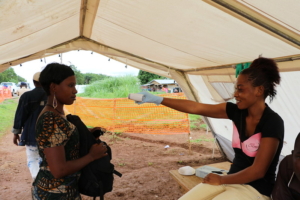Disease Prevention in Sierra Leone
 Disease has inflicted much damage across Sierra Leone, causing the country to have an average life expectancy of only 61 years compared to the global average of 73. However, with help from various health organizations and policies, disease prevention in Sierra Leone has improved.
Disease has inflicted much damage across Sierra Leone, causing the country to have an average life expectancy of only 61 years compared to the global average of 73. However, with help from various health organizations and policies, disease prevention in Sierra Leone has improved.
Infection Prevention and Control
During the Ebola outbreak from 2013 to 2015, 8,706 citizens of Sierra Leone were infected with Ebola. At the time, limited awareness of hygiene and infection control was an issue among Sierra Leone’s healthcare providers. To combat this, Sierra Leone’s Ministry of Health and Sanitation created a National Infection Prevention and Control Unit, or NIPCU, to provide oversight in all Health care processes. With the new implementation of policies and standardized training, the NIPCU serves to bring a united front for disease prevention in Sierra Leone.
As of 2016, the NIPCU established 28 isolation units across Sierra Leone, providing a total bed capacity of 190, and trained a total of 8,221 health workers. The Infection Prevention and Control policies provided a much-needed form of organized education and training within Sierra Leone. However, caring for the ill requires a group effort.
Centers for Disease Control and Prevention
Going hand in hand with IPC, the Centers for Disease Control began helping Sierra Leone during the Ebola epidemic by training healthcare workers. The CDC also supported Sierra Leone during the COVID-19 pandemic, which saw a total of 7,674 confirmed cases. To combat COVID-19, the CDC introduced an IPC Certification Course, whose graduates continue assisting people infected with COVID-19.
As of March 2021, 43 graduates of Sierra Leone’s Advanced IPC Certification Course serve as mentors and supervisors, providing continued oversight of the practices established by the IPC and CDC. The success of the CDC continues to guide Sierra Leone towards other disease treatments. According to the CDC, Sierra Leone’s National HIV Response is looking at epidemic control by 2030.
International Federation of Red Cross
Supporting the Sierra Leone Red Cross, the International Federation of Red Cross has helped prepare communities to stop the spread of diseases, such as measles, Acute watery diarrhea, and viral hemorrhagic fever. The IPC and the CDC focus on preparing communities for outbreaks and disease prevention in Sierra Leone. However, the IFRC emphasizes community engagement, resilience building, education, and transportation in addition to their volunteer and training efforts. Activities include:
- Preparing various sectors on how to respond to potential outbreaks to maintain the economy
- Training media to convey important lifesaving information to affected communities
- Interacting with students, teachers, and schools to prepare them with important epidemic messages and referrals.
The IFRC and Sierra Leone Red Cross have trained over 200 government partners and volunteers in disease preparedness and community surveillance.
The organizations and policies working in Sierra Leone have made strides in creating a standardized system for monitoring, preparation, and prevention in Sierra Leone. While there is still work to be done in improving health in the country, the progress made in education and training in Sierra Leone is essential in the journey ahead.
– Matthew Perduk
Matthew is based in Chantilly, VA, USA and focuses on Good News and Global Health for The Borgen Project.
Photo: Flickr
